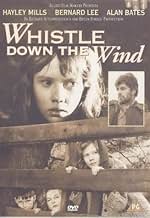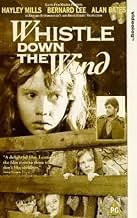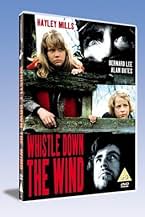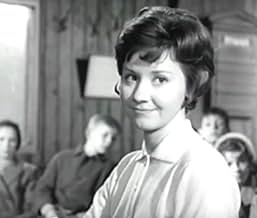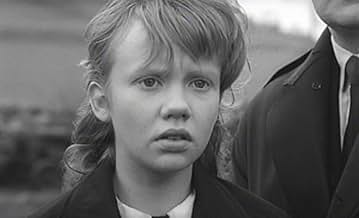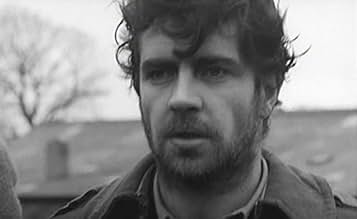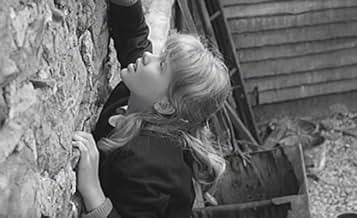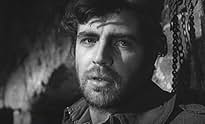IMDb-BEWERTUNG
7,6/10
3983
IHRE BEWERTUNG
Füge eine Handlung in deiner Sprache hinzuWhen an injured wife murderer takes refuge on a remote Lancashire farm, the owner's three children mistakenly believe him to be the Second Coming of Christ.When an injured wife murderer takes refuge on a remote Lancashire farm, the owner's three children mistakenly believe him to be the Second Coming of Christ.When an injured wife murderer takes refuge on a remote Lancashire farm, the owner's three children mistakenly believe him to be the Second Coming of Christ.
- Regie
- Drehbuch
- Hauptbesetzung
- Nominiert für 4 BAFTA Awards
- 1 Gewinn & 5 Nominierungen insgesamt
Empfohlene Bewertungen
Beautifully photographed in black and white this film should be considered a MASTERPIECE! Haley Millsgives the performance of her career (maybe next to"Tiger Bay) as Cathy. Alan Bates is also excellent! It is real shame that these classic films do not get airplay on cable.
Hayley Mills excels in this understated, underrated movie juxtaposing the sordid criminal world (Alan Bates as a murderer on the run) with the innocence of children. Cleverly designed, perfectly acted (by all the children as well as the adults), pithily appropriate screenplay, believable accents (the setting is the Yorkshire moors in England), and a well-balanced, carefully planned production all combine to produce a mesmerising gem of a film. Already a star, Hayley Mills proved she was not just a pretty face and built on her impressive performance in Tiger Bay to create a moving character of budding adolescence, still trapped in childhood innocence and belief. The period of the early sixties is neatly conveyed, and Hayley Mills as Cathy creates a metaphor for the deeper layer of the film's message of the increasing social awareness and diminishing religious belief (despite the traditional Sunday School attitudes and practices) which was gradually bringing about the social change of Britain in the sixties. The story is well told, the drama is dynamic, the actors do a marvellous job and the film certainly deserves to be better known, if not least because it's an early example of Richard Attenborough's production skills.
An absolute gem of a movie, that will appeal to both the religious, & atheists alike, since it intelligently sides with neither side. WDTW is a beautifully crafted study in "belief", faith and innocence.
Reminiscent of Ken Loach's 1969 film Kes (although the two are very different films) in so much that it accurately portrays a time & place, by using genuine locals as a supporting cast, thus giving a true sense of authenticity because of the genuine regional accents.
Little Alan Barnes's natural lancashire dialect is a pure delight in the opening scene with "The sally army lady", and his loss of "faith" in "Jesus" ("T' aint Jesus, its just some fellah") is a poignant counterpoint to Mills's stoic acceptance of the fugitive hiding in the family barn as her saviour.
Highly recommended viewing.
Reminiscent of Ken Loach's 1969 film Kes (although the two are very different films) in so much that it accurately portrays a time & place, by using genuine locals as a supporting cast, thus giving a true sense of authenticity because of the genuine regional accents.
Little Alan Barnes's natural lancashire dialect is a pure delight in the opening scene with "The sally army lady", and his loss of "faith" in "Jesus" ("T' aint Jesus, its just some fellah") is a poignant counterpoint to Mills's stoic acceptance of the fugitive hiding in the family barn as her saviour.
Highly recommended viewing.
Forbes' well-loved film performs a delicate balancing act between symbolism and naturalism, and does so with sensitivity and humour. His achievement becomes more evident when one considers the recent Andrew Lloyd-Webber version of this story, which considerably Americanised and coarsened it, floundering badly as a result. Director Forbes, whose first and arguably finest film this was, had previously been better known as an actor. His skills and experience are in evidence from the start here, as he brings the best out of the children who make up a good proportion of his cast.
In a film that has a lot to say about the grander issues of religion, a lot of the real pleasure here comes from the quieter interactions between youngsters, as they either gauchely hide things from their elders, or express the ironies of simple belief. Juxtaposing the innocence of childhood with the cruelty and persecution of the adult world, and with a fair dose of symbolism and various interpretative levels, the result is in some contrast to the other prestigious productions of the time. The recent ground breaking kitchen sink dramas such as that by Karel Reisz (Saturday Night And Sunday Morning, 1960) or pictures of aggressive social mobility from Jack Clayton (Room At The Top, 1959) were full of working class characters. They focussed on the newly discovered reality of their aims and aspirations, and were part sociological exploration of class, part attempt to wrestle poetry of sorts from everyday life. While Whistle Down the Wind benefits from the breath of fresh air currently blowing through the British industry - the location shoot and naturalistic performances are especially characteristic and effective - the sympathetic portrayals in the film serve to emphasise the fact that its concerns are less sociological than theological, even if its slightly self-conscious air shows a continuing concern to gain a 'significance' from the community, at least of some sort. It's a film where outright class-consciousness rarely raises its head while the anger of the times, seen elsewhere on the contemporary screen, is almost entirely absent. In fact when they occur at all, such issues only appear in the context of organised religion, as for instance when the children encounter the doctrinal certainties of the local vicar, an aloof establishment figure, much more concerned with the vandalism of his church than the urgent questions of his young parishioners. The irony is of course that, while discussing the missing guttering from the church, he is entirely unaware that real spirituality exists in the barn down the road in the hearts of children.
Whistle Down The Wind is something of a family affair, in more ways than one. Not only do the principals mostly spring from the Bostock family or their close acquaintances, but the film itself is based on a novel by Mary Hayley Bell, the wife of actor John Mills and mother of Hayley - who plays the lead Kathy. Some have objected that she is too old to play the part and, strictly speaking this is true, although on screen her proximity to womanhood allows her "I love you" to The Man Blakey (Alan Bates) a meaning potential unavailable to a younger performer. Hayley's role and performance reminds one of another she had provided a couple of years back, in Tiger Bay, a related tale of a platonic love between a child and a murderer. The star spent a good deal of her early career in British film persuading audiences that she could successfully grow up on screen.
Much of the success of the film springs from its gentle and sophisticated treatment of religion. Put in the mouths of babes, doctrinal criticism is thereby sidestepped and the biggest, potential, objection to the piece - that the confusion of a murderer with Christ might be blasphemous - is largely defused by having The Man say very little (his main conversation, an imitation of the parables, is a re-telling to a rapt audience of 'Ruth Lawrence, air hostess' from a comic). The mistake in recognition is made by innocents, and is therefore understandable. The director overcomes objections by charm. And while Forbes has his Man reinforce the mistaken impression by his opening words, the first sight of him, arms outstretched newly appeared in a 'stable' (a evocative stance reprised as he ultimately surrenders), suggestive heavenward point-of-view-shots and so on, the audience is never made to feel uncomfortable with the suggestions. In fact at a time when the BBFC had firm views on the Church and established religion seen on screen, the only other title that comes easily to mind dealing with such matters in a light-hearted and successful way is the very different Boulting brothers' Heavens Above!, with Peter Sellars.
The film's charm is greatly enhanced by a memorable score by Malcolm Arnold, the highlight of which is reworking of We Three Kings - perkily reprised up tempo as the trio of youngsters pay their homage to their 'Christ', or while choreographing a march down the road. The ensemble playing of the film is excellent. Bernard Lee (more familiar to audiences as 'M' in the James Bond series) turns in sterling work as father Bostock, while among the younger actors Alan Barnes as Charlie is also a standout. It is Charlie who expresses the final disillusionment: "It isn't Jesus, it's just some fella," but faith of sorts remains amongst many of the children, even as Blakey is led away. The film's final sense is of religious reinforcement rather than disappointment ("You missed him this time but he'll be coming again," Kathy tells some latecomers to the barn) while the details of the murder in question is left sufficiently vague so as not to entirely deprive Bates' character of sympathy, even as he is handed over to the authorities. There's a sense that the killer has been redeemed by the innocence and trust of his admirers rather than the other way round - a subtly ironic turn of events, which never the less makes for a satisfying conclusion. For those who enjoy British cinema of this decade the charming experience offered by Forbes' debut is unmissable, while others who have seen the film before there will be no hesitation.
In a film that has a lot to say about the grander issues of religion, a lot of the real pleasure here comes from the quieter interactions between youngsters, as they either gauchely hide things from their elders, or express the ironies of simple belief. Juxtaposing the innocence of childhood with the cruelty and persecution of the adult world, and with a fair dose of symbolism and various interpretative levels, the result is in some contrast to the other prestigious productions of the time. The recent ground breaking kitchen sink dramas such as that by Karel Reisz (Saturday Night And Sunday Morning, 1960) or pictures of aggressive social mobility from Jack Clayton (Room At The Top, 1959) were full of working class characters. They focussed on the newly discovered reality of their aims and aspirations, and were part sociological exploration of class, part attempt to wrestle poetry of sorts from everyday life. While Whistle Down the Wind benefits from the breath of fresh air currently blowing through the British industry - the location shoot and naturalistic performances are especially characteristic and effective - the sympathetic portrayals in the film serve to emphasise the fact that its concerns are less sociological than theological, even if its slightly self-conscious air shows a continuing concern to gain a 'significance' from the community, at least of some sort. It's a film where outright class-consciousness rarely raises its head while the anger of the times, seen elsewhere on the contemporary screen, is almost entirely absent. In fact when they occur at all, such issues only appear in the context of organised religion, as for instance when the children encounter the doctrinal certainties of the local vicar, an aloof establishment figure, much more concerned with the vandalism of his church than the urgent questions of his young parishioners. The irony is of course that, while discussing the missing guttering from the church, he is entirely unaware that real spirituality exists in the barn down the road in the hearts of children.
Whistle Down The Wind is something of a family affair, in more ways than one. Not only do the principals mostly spring from the Bostock family or their close acquaintances, but the film itself is based on a novel by Mary Hayley Bell, the wife of actor John Mills and mother of Hayley - who plays the lead Kathy. Some have objected that she is too old to play the part and, strictly speaking this is true, although on screen her proximity to womanhood allows her "I love you" to The Man Blakey (Alan Bates) a meaning potential unavailable to a younger performer. Hayley's role and performance reminds one of another she had provided a couple of years back, in Tiger Bay, a related tale of a platonic love between a child and a murderer. The star spent a good deal of her early career in British film persuading audiences that she could successfully grow up on screen.
Much of the success of the film springs from its gentle and sophisticated treatment of religion. Put in the mouths of babes, doctrinal criticism is thereby sidestepped and the biggest, potential, objection to the piece - that the confusion of a murderer with Christ might be blasphemous - is largely defused by having The Man say very little (his main conversation, an imitation of the parables, is a re-telling to a rapt audience of 'Ruth Lawrence, air hostess' from a comic). The mistake in recognition is made by innocents, and is therefore understandable. The director overcomes objections by charm. And while Forbes has his Man reinforce the mistaken impression by his opening words, the first sight of him, arms outstretched newly appeared in a 'stable' (a evocative stance reprised as he ultimately surrenders), suggestive heavenward point-of-view-shots and so on, the audience is never made to feel uncomfortable with the suggestions. In fact at a time when the BBFC had firm views on the Church and established religion seen on screen, the only other title that comes easily to mind dealing with such matters in a light-hearted and successful way is the very different Boulting brothers' Heavens Above!, with Peter Sellars.
The film's charm is greatly enhanced by a memorable score by Malcolm Arnold, the highlight of which is reworking of We Three Kings - perkily reprised up tempo as the trio of youngsters pay their homage to their 'Christ', or while choreographing a march down the road. The ensemble playing of the film is excellent. Bernard Lee (more familiar to audiences as 'M' in the James Bond series) turns in sterling work as father Bostock, while among the younger actors Alan Barnes as Charlie is also a standout. It is Charlie who expresses the final disillusionment: "It isn't Jesus, it's just some fella," but faith of sorts remains amongst many of the children, even as Blakey is led away. The film's final sense is of religious reinforcement rather than disappointment ("You missed him this time but he'll be coming again," Kathy tells some latecomers to the barn) while the details of the murder in question is left sufficiently vague so as not to entirely deprive Bates' character of sympathy, even as he is handed over to the authorities. There's a sense that the killer has been redeemed by the innocence and trust of his admirers rather than the other way round - a subtly ironic turn of events, which never the less makes for a satisfying conclusion. For those who enjoy British cinema of this decade the charming experience offered by Forbes' debut is unmissable, while others who have seen the film before there will be no hesitation.
Produced by Sir Richard Attenborough (Jurassic Park), and written by Lady Mills (wife of Sir John, a veteran British actor), this is a charming look at childhood, through the eyes of three children, in the early 60`s. An injured, escaped murderer seeks refuge in their barn (Alan Bates), the kids find him, and believe hes Jesus...(when they ask who he is, he mutters `Jesus Christ!`). The script is so innocent, we were these children not so long ago, theres a little of them in all of us.. Hayley Mills (daughter of Sir John Mills, and the star of many Disney movies), stars as Cathy, the eldest of the kids, barely in her teens. Bernard Lee (`M` in countless James Bond movies), plays the father of the family... What makes it so good, is the way the kids converse with each other, their innocence of thinking that a holy figure has come to live in their barn, of all places!! It doesn`t mean to be funny, but it is. Its all too light hearted to be anything else..Just a wonderful, very little known movie.
Wusstest du schon
- WissenswertesThe title "Whistle Down the Wind" originally comes from falconry and means "to let a falcon fly away free."
- PatzerIn several scenes, but especially when the children are in the barn discussing a name for the cats, the youngest boy can be seen mouthing the other characters lines before he says his own.
- Zitate
Charlie Bostock: It isn't Jesus. It's just a fella.
- Crazy CreditsThe character played by Alan Bates is named Arthur Alan Blakey in the movie, but in the credits he is listed as "The Man."
- VerbindungenFeatured in Blue Peter: Folge #4.32 (1961)
- SoundtracksWe Three Kings
(uncredited)
Words and Music by John H. Hopkins (as Reverend John Henry Hopkins,, Jr.)
Incorporated into incidental music
Top-Auswahl
Melde dich zum Bewerten an und greife auf die Watchlist für personalisierte Empfehlungen zu.
- How long is Whistle Down the Wind?Powered by Alexa
Details
- Erscheinungsdatum
- Herkunftsland
- Sprache
- Auch bekannt als
- Whistle Down the Wind
- Drehorte
- Produktionsfirmen
- Weitere beteiligte Unternehmen bei IMDbPro anzeigen
Box Office
- Budget
- 148.000 £ (geschätzt)
- Laufzeit1 Stunde 39 Minuten
- Farbe
- Seitenverhältnis
- 1.66 : 1
Zu dieser Seite beitragen
Bearbeitung vorschlagen oder fehlenden Inhalt hinzufügen

